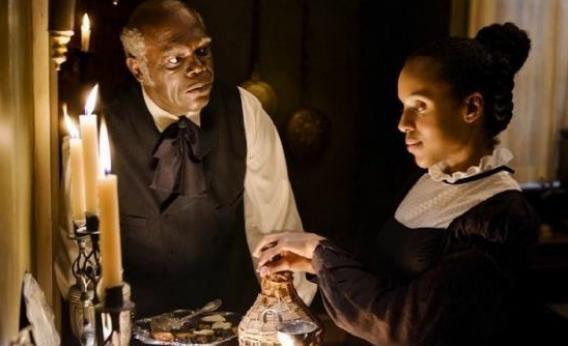Leonardo DiCaprio is widely seen as a favorite for one of the five Best Supporting Actor nominations that the Academy will announce on Thursday. Christoph Waltz has a good chance, too, according to Oscar watchers. Samuel L. Jackson, meanwhile, their Django Unchained co-star, is a 100 to 1 shot, according to Gold Derby, one of the leading awards websites. Those are the same odds given to Samuel West, for his role in the critically panned Hyde Park on Hudson, and Chris O’Dowd, for his part in a generally unnoticed film called The Sapphires.
This is a shame. Jackson’s performance is one of the best of his career, and he’s playing what I would argue is the best and most complicated character Quentin Tarantino has ever put on screen. There are probably many reasons that Jackson is being mostly ignored during this Oscar season—the Academy is mostly made of old white men, of course, and black acting nominees continue to be few and far between. Yet it’s hard not to suspect that his character, Stephen, simply makes people too uncomfortable.
It’s not just white viewers who are squirming. Among the smartest pieces written about the film is one by Jelani Cobb, published last week on The New Yorker’s Culture Desk blog. Cobb, a history professor, argues that Django Unchained is “not a riff on history,” but “a riff on the mythology we’ve mistaken for history,” and that Tarantino seems unaware of that distinction. The piece is worth reading in full, but ultimately it gets the movie wrong by misinterpreting the crucial—and controversial—character played by Jackson.
Stephen is the “house nigger” of Calvin Candie (DiCaprio). Some time before the movie begins, Candie purchased Broomhilda (Kerry Washington), the wife of Django (Jamie Foxx). When Django and his bounty hunting partner, King Schultz (Waltz) arrive at Candie’s plantation with the aim of rescuing Broomhilda, both Stephen and Candie stand in their way. As Cobb rightly notes, Stephen, more than Candie or any of the white characters, is Django’s true nemesis. For Cobb, though, Stephen represents “an instance in which a white director holds an obsequious black slave up for ridicule. The use of this character as a comic foil,” he adds, “seems essentially disrespectful to the history of slavery.”
It’s true that Stephen at first appears like your run-of-the-mill Uncle Tom stereotype, laughably subservient to Candie. But his role as a figure of fun does not last past his first scene. He soon goes from uncomfortably amusing to downright terrifying, while the true levity is reserved for the dumb, clueless owners—particularly Candie, who is oblivious to the deceptions of Schultz and Django until Stephen clues him in. When Stephen shares what he has deduced, there is a remarkable shift in his body language and tone that nearly reverses the power dynamic between master and slave. (Though we don’t see their backstory in the finished movie, Jackson has said that his character “raised Candie.”)
Of course, Stephen’s limited power depends upon his discomfiting, unflinching loyalty to that master. Other films have featured characters who showed similar loyalty—Gone With the Wind comes to mind—but they have portrayed their grinning, eager-to-please servants without any hint of dissembling, reinforcing the idea that slaves were happy to remain in bondage. The character of Stephen, on the other hand, uses that loyalty as a kind of personal power. It is a perverted and troubling sort of power, to be sure—but a kind that gets at the profound psychological suffering slavery produced. In creating Stephen, Tarantino seems to have given real thought to the complicated pain of the “peculiar institution.”
Contrary to what one bit of Candie’s dialogue implies, many actual slaves were willing to band together to escape—as Cobb points out, owners were constantly in fear of rebellions and subversions. But there were also those who clung to whatever power they had. Not long after I saw the movie, my father, who’s been researching the journalistic portrayal of blacks in the Hartford Courant, one of the country’s oldest continuously published newspapers, sent me a March 17, 1859 article about two black men who were caught trying to flee their Southern owners. One of the slaves was light enough to appear “perfectly white,” according to the paper, and they boarded a train as slave and slave owner, respectively. They were reportedly undone by another black man working aboard the train, who recognized them both and informed the conductor.
Of course, Django Unchained is a revisionist fantasy, so the best question to ask probably isn’t whether a man such as Stephen did or could have existed. The question, rather, is what that character means in the universe of the movie itself. I agree with Cobb that Stephen serves to “highlight the depravity of the institution,” and we are obviously meant to find him deeply problematic and to feel uncomfortable watching him. That discomfort is the point: Jackson’s twisted portrayal strives to convey how slavery could inflict nearly unfathomable psychological damage, as well as unthinkable suffering of a more obvious, physical kind.
